Text
Amanecer en Cuba
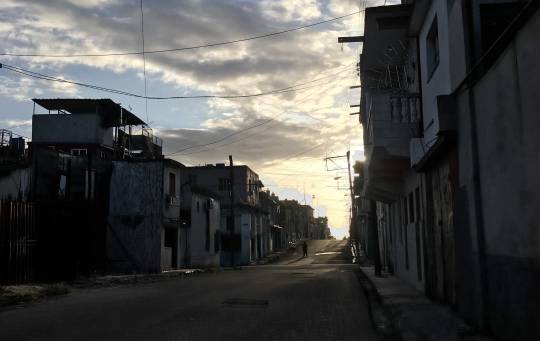
Hay experiencias que marcan nuestra vida. La cuarentena me tiene reflexiva y apreciando más las pequeñas cosas. Hace exactamente dos meses atrás, viajé a Cuba por primera vez. Todavía pienso en lo significativo que fue ese viaje para mi y aquí intentaré resumir por qué.
Después de vivir en Miami por varios años, el acento cubano no me era extraño. De hecho, cuando me regresé a Puerto Rico, el acento boricua era el que me parecía diferente pues pasé varios años acostumbrada a escuchar los “’ñooooo” y “asere, qué bolá” en todo momento.
Algo que siempre me alegraba en cualquier esquina en Miami es que solo al decir “buenos días” me preguntaban “¿boricua?”. Al contestar que sí, la respuesta más común era “Cuba y Puerto Rico, de un pájaro las dos alas”, haciendo referencia al poema de Lola Rodríguez de Tió. Y así, en un instante, ya fuera en la Iglesia, en el supermercado o en la cafetería mientras ordenaba una colada (wow, como la extraño), nos conectábamos y nos sentíamos en familia.
Al aprender de la realidad en Miami, es imposible no leer sobre el exilio cubano y su experiencia. Conocí muchas historias de primera mano que me retaron a aprender sobre una realidad a la cual los puertorriqueños nunca hemos estado expuestos. Aprendí sobre las ramificaciones de sus resentimientos y las complejidades de sus frustraciones, y muchas veces fui testigo de sus reclamos. Entonces, llegué a Cuba y aprendí que muchas perspectivas tienen experiencias paralelas, y otras son muy, pero que muy, distintas. Sin embargo, me sentí tan en casa como cuando estoy en mi querido Cupey en San Juan, Puerto Rico.
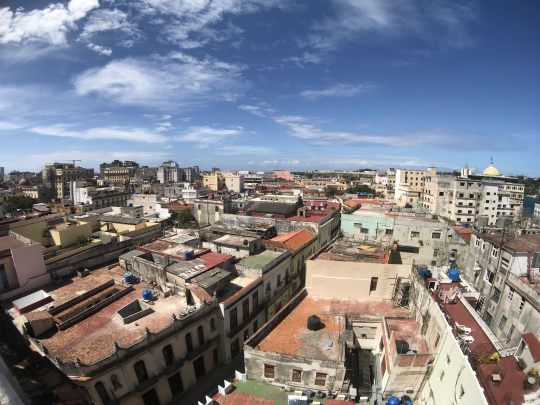
Durante una de mis reuniones, una pastora me identificó como puertorriqueña luego de solo decir “Buenas Noches”. Recuerdo que quien estaba a mi lado me dijo: “pero, ¿cómo supo?”. Yo pensé: “o tengo un acento mega marcado, o es obvio”. No sé, pero me transportó a las cafeterías en Miami donde lo mismo ocurría.
Antes del viaje nos enviaron lecturas con información de historia y contexto sobre Cuba y los temas que hablaríamos durante nuestro tiempo allá. En Cuba, visitamos diferentes Iglesias y conocimos sobre proyectos y necesidades que tienen en sus comunidades. Muchas de las cosas son muy parecidas a dinámicas que veo en Puerto Rico, otras me parecían completamente noveles. Aprendí mucho. Posiblemente, aprendí más de lo que pude aportar.
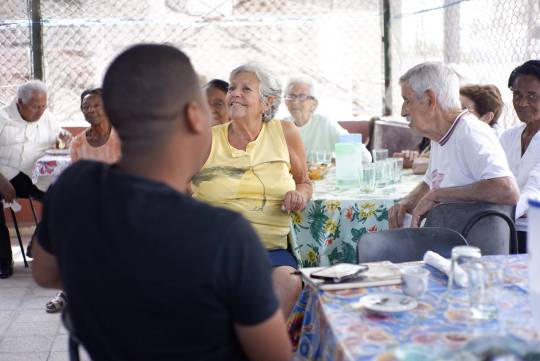
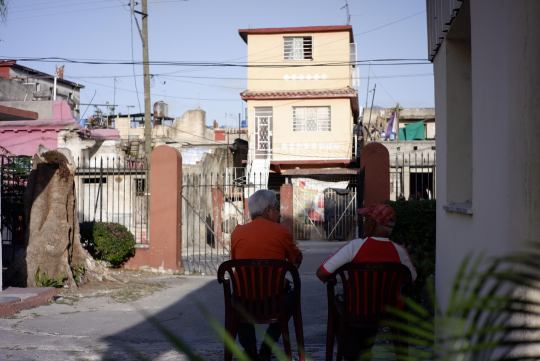
Los últimos dos días los pasé de turista, compartiendo con quienes muy amablemente me carretearon por toda La Habana. Aunque llevaba solo 6 días allá, sentía que llevaba mucho más. El cariño y cuidado que recibí fue el mismo que le damos a nuestras visitas cuando vienen acá. A mí se me olvidaba que estaba en otro país, y que estaba con personas que acababa de conocer. Así de bien lo pasé. Y es que, pienso yo, hay demasiadas cosas que unen a Cuba y Puerto Rico. Desde realidades sociales hasta el amor por la música, desde la historia hasta el diseño de nuestras banderas, desde el amor patrio, hasta las bebidas refrescantes. Las ganas de bailar y de comer bien fueron abastecidas al 100 por ciento. Y la gente, la gente de Cuba es lo más lindo que se puede encontrar.
A mi me tocó ir a Cuba luego de varias transiciones y retos en mi vida. Emocionalmente no había estado en mi mejor lugar, y fueron más las frustraciones que los logros en los pasados años. Pero, recientemente compartí que ese viaje había sido un amanecer para mi. Reconecté con algunos aspectos de mi vida que tenía en el limbo, y me reí como hacía mucho no lo hacía. Y es que me sentía en casa, algo que me habían dicho antes de ir pero no lo asimilé hasta que llegué.
El tiempo en Cuba fue un respiro, pero también fue un tiempo de organizar muchos de mis pensamientos. Fue tiempo de reconectar con proyectos que había abandonado, y tiempo de soñar con cosas nuevas. Cuba me devolvió la esperanza y las ganas de hacer y ser. En Cuba tuve conversaciones que me hicieron crecer, abordamos temas relevantes e importantes para mi (especialmente cuando trabajo en la Iglesia pero no tengo ningún titulo “oficial”). Vamos, que esta cuarentena me he sentido más productiva que nunca gracias a esa inspiración.
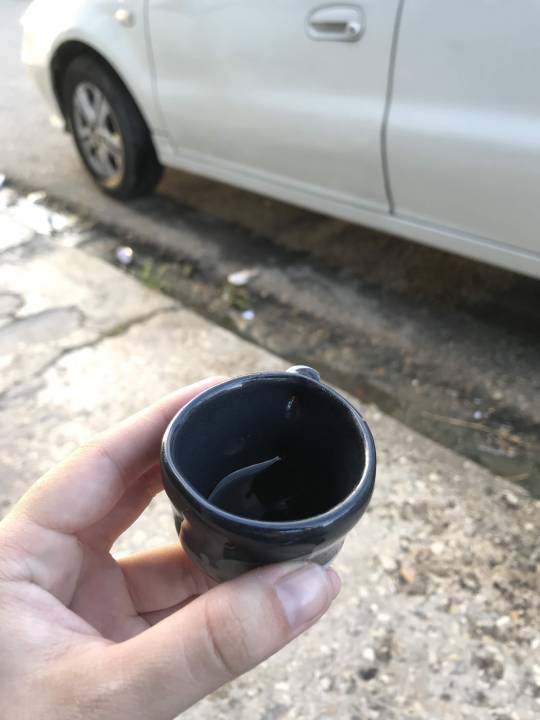
Mi última mañana en Luyanó, pregunté dónde podía tomarme un café y me llevaron a una casa. Allí, en el balcón, junto a Silvia -quien preparó el café- y Oscar -quien lavaba su carro frente a la casa de Silvia-, me tomé mi último cafecito mientras hablábamos de Puerto Rico. Oscar había visitado la Isla y empezó a contarle a Silvia sobre la Bomba y la Plena. Los acababa de conocer y no estuve mucho tiempo con ellos, pero fue de las experiencias más bonitas.
No fue hasta después que regresé a Puerto Rico que realmente entendí los versos de Lola, especialmente los siguientes:
“Yo no me siento extranjera:
bajo este cielo cubano
cada ser es un hermano
que en mi corazon impera.
Si el cariño por do quiera
voy encontrando a mi paso,
¿Puedo imaginar acaso
que el sol no me dé en ofrenda,
un rayo de luz que encienda
los celajes de mi ocaso?
Vuestros dioses tutelares
han de ser también los míos!
Vuestras palmas, vuestros ríos
repetirán mis cantares…
Culto rindo a estos hogares
donde ni estorba ni aterra
el duro brazo que cierra
del hombre los horizontes…
Yo cantaré en estos montes
como cantaba en mi tierra!
Cuba y Puerto Rico son
de un pájaro las dos alas,
reciben flores o balas
sobre el mismo corazón…
¡Que mucho si en la ilusión
que mil tintes arrebola,
sueña la musa de Lola
con ferviente fantasía,
de esta tierra y de la mía
hacer una patria sola!”
Mientras tanto, mientras escucho la música que me regalaron antes de regresar, acá estoy contando los días para volver.

2 notes
·
View notes
Text
Poco a poco se sana
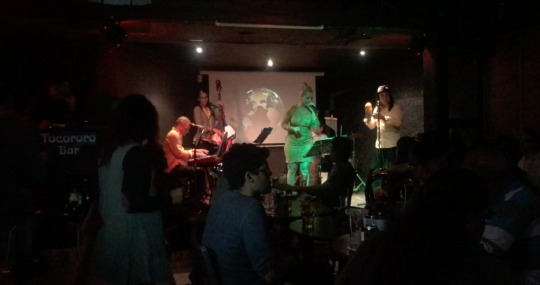
Hace tiempo no escribo por acá y, con el tiempo que el COVID19 nos ha dado a todxs, se me ocurrió que podría darle un update a mi super blog intermitente.
Hace unas semanas, Residente publicó la canción “René”. He visto el video como 1,000 veces (una exageración, pero ustedes entienden...) y, además de que me encantó el video, me pude identificar con más versos de los que hubiera imaginado.
Desde que la escuché por primera vez, los 7 minutos 37 segundos me transportaron a muchos momentos en mi vida (estoy segura de que no fui la única), pero me impactó de tal manera que estuve varios días super reflexiva sobre mi vida y los últimos años.
“Ya no queda casi nadie aquí
A veces ya no quiero estar aquí
Me siento solo aquí
En el medio de la fiesta
Quiero estar en donde nadie me molesta...”
Cuando regresé a Puerto Rico en el 2017, comencé un proceso sumamente incómodo de transición. La mudanza fue forzada, aunque estaba contenta de que me regresaba a casa con mi familia y amigos. La realidad es que muchos no entendieron cómo todo me estaba afectando y a qué nivel. El proceso de adaptación fue más largo y frustrante de lo que imaginé.
“Y si me contestan, quiero decirles que quiero bajar el telón...”
Para añadirse a mi transición, me enfrenté con la pérdida de mi Titi Elena. Aún me cuestiono una y otra vez porqué no podía quedarse o porqué la conclusión no pudo haber sido diferente. Ha sido un proceso difícil manejar su pérdida y encontrar algún tipo de motivación y/o propósito en todo esto. Sin embargo, el fin de semana pasado soñé con ella.
Lo interesante del sueño es que estaba consiente de que ella ya no estaba entre nosotros (incluso me preguntaba durante el sueño por qué ella tenía que irse), pero que la tenía a mi lado en ese momento. Estábamos como en una fiesta, y pasó un carrito con cervezas donde busqué una gluten free para que ella se la pudiera tomar. Quizás así, con par de sueños más, pueda seguir sanando esto.
Algo en lo que caí en cuenta después fue algo que pasó unos días antes del sueño. Estaba en un restaurante en La Habana, Cuba donde (obviamente el corillo de cubanos con los que andaba me identificó como boricua con la del conjunto y me llamaron pa’ la tarima). Allí, el conjunto tocó El Bombón de Elena. Fue un sentimiento muy lindo el celebrar la música de mi Puerto Rico, pero que precisamente fuera también una canción con el nombre de mi tití. Quizás fue solo una casualidad, pero me hizo sonreír.
“Quiero volver a sentir, a cuando no tenía que fingir
Yo, quiero volver a ser yo”
En mi última noche en La Habana, mientras me tomaba un café con mis nuevos amigos, hablamos de muchas cosas. Pero algo que se me quedó en la mente era sobre la importancia de ser uno mismo, independientemente el espacio donde se esté. En los últimos meses, han habido muchos momentos en los que me he reservado el cómo me siento, pero puedo afirmar que en ese momento me sentía más yo que las semanas anteriores. Poco a poco se sana.
(...o quizás cuando se mezclan las Bucanero y Cristal con salsa cubana (y un wikén en Miami) produce un elemento medicinal que combate hasta al coronavirus)
2 notes
·
View notes
Text
Hope in Korea
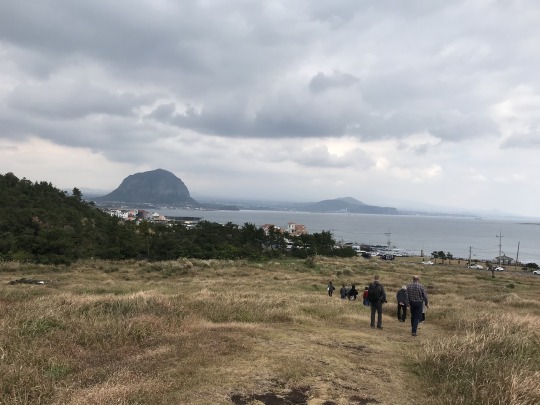
It was our first lunch in Seoul. We walked to a restaurant, headed to a room reserved for us, left our shoes at the door and sat down. Table was already filled with different plates with food. Right then, I started asking what I asked throughout the whole trip while pointing out at things: “what’s this?” and “what’s that?”. I certainly felt like an annoying little kid (I didn’t want to, though!), but I really wanted to learn what was on the table. Seeing my bowl with white rice always made me happy, since rice is a staple food at home, but most of the time in Korea I really wasn’t sure what was served in front of me. The saying “barriga llena, corazón contento” (“Filled tummy, happy heart”) that we constantly say in Puerto Rico was basically my thought after every meal. At the end of this trip, my heart was happy, and food was just one of the reasons why.
Last November, I was able to visit Korea as part of a Travel Study Seminar with the PCUSA Peacemaking Program. This was not your usual touristy trip, but an intentional opportunity to learn about issues present in the place you visit. The interjection between the country’s history and today’s conflicts is shared through local voices in church and/or partner organizations. After the trip, the invitation is to return home and share with your community what you’ve witnessed and learned. I had the opportunity to go to Colombia in 2015 and didn’t want to miss this as I knew it will challenge the participants to get a deeper perspective into the issues in Korea. This has been the furthest I’ve been from home.
We had the opportunity to visit different places in Seoul, Jeju Island, the Demilitarized Zone (DMZ) in Cheorwon, Nogeun-Ri, among other. The irony between walking around very beautiful landscapes that were actually the scenario for massacres and cruel events was overwhelming. However, it was inspiring to witness so many powerful voices -in the midst of mourning and sorrow- advocating for peace in the Korean Peninsula.

During my time in Korea, I was constantly reminded of cultural differences while realizing there are more similarities to home than I thought. In less deep but truly engaged activities, I also had some time for norebang.
Few weeks ago, I was asked if I could compare US presence in South Korea with their presence in Puerto Rico. I have to say I constantly found myself in conflict while listening about US Military influence and presence in South Korea, while also remembering over 60,000 Puerto Ricans fought in the Korean War. It felt like I was caught up in the middle of an issue and could identify with both parts.
It was hard visiting a place like Nogeun-ri, while listening to the sound of a small stream with a beautiful fall-colored scenery in the background, and reflect about the lives that were killed by the US Army during the Korean War. We walked through the 2-tunnel bridge as a survivor shared his story while showing bullet marks on the wall reminding all of us this historic event wasn’t that long ago. Next to the bridge, a Peace Park honoring the lives lost there and inviting people to learn, reflect in what this meant, and how it got public attention. A story that also shook me was one of a mother who was shot dead while nursing her baby.
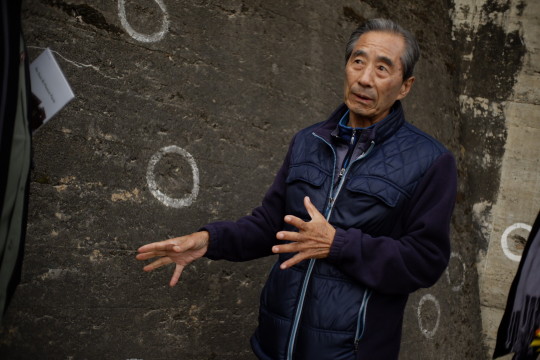
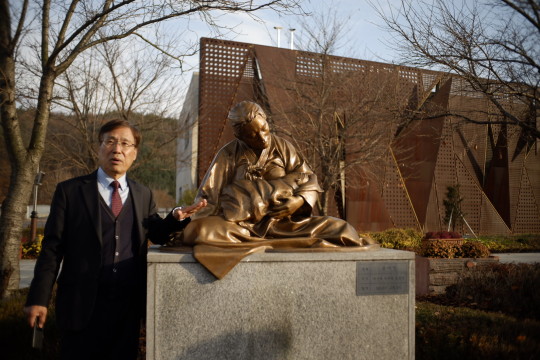
Back in Seoul, we learned more in depth about “comfort women”, who were sexually exploited by Japanese soldiers in Korea and other countries. Their stories were silenced for too long. Today, advocates not only lead an inspiring but challenging museum to tell these true stories, but also meet every single Wednesday for a demonstration in front of the Japanese Embassy in Seoul asking for their government to apologize. We were able to participate in one demonstration while we were there. They have been doing these Wednesdays demonstrations for 25 years. Every. Single. Wednesday.

(photo by Gregg Brekke, Presbyterian News Service)
You can read more about our participation at the Wednesday demonstration, visit to DMZ and Nogeun-ri here.
We also spent few days in Jeju Island. This is a known location for celebrities to have their houses, but it holds a dark history of apprehension, tension and death. Learning about the 4.3 Uprising and Massacre, and all the events surrounding it in a period of years, was as sad and frustrating as it could be. History is there, and yet it still struggles to get acknowledged.

We visited the Gangyeong community, where a newly-constructed military base was built on their shore, for debatable reasons. While we went and learn about the advocacy work done there, we participated in a protest that took place at the gates of the base. It was unexpected to see the joy walking alongside tension. After walking and hosting a rally at the gates, we sang, danced (even those of us foreigners completely lost on the choreography but trying our best!), and celebrated as a community.

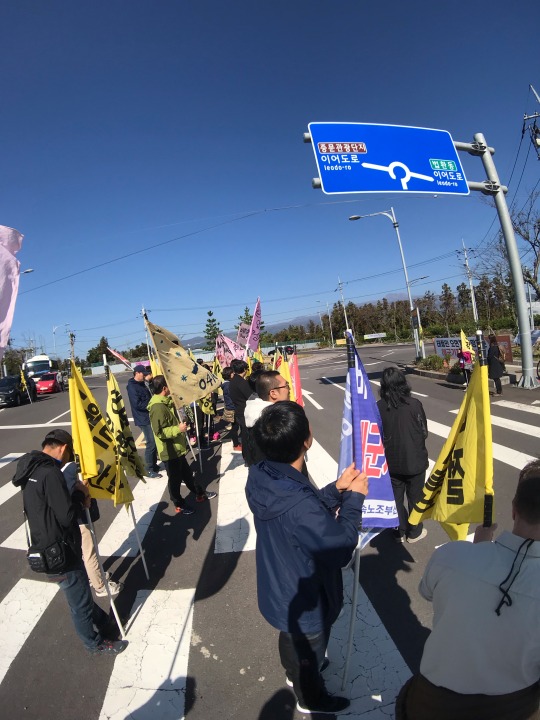
Jeju island reminded me to the efforts in Vieques (municipality-island southeast of Puerto Rico) to remove the military base that served as a bombing-test field over 10 years ago. The conversation about independence, political views and the constant criminalization of advocates in Jeju seemed I was hearing about home and not about something happening across the world. During our visit, we met with resilient leaders about their experiences and struggles. I was inspired to see young leaders alongside experienced advocates involved in this.
You can read more about our visit to Jeju here.
One Korea
Even thought it may sound like some kind of utopia on this side of the world, I was fortunate to hear the local perspective around the unification of the Koreas. Regardless of how far or near this may seem (now with US government having this conversation), there is a common hope for the Korean Peninsula to re-unite (which comes as a surprise to many who ask about my trip). It was interesting to hear how many Koreans felt about current US Government and how they are paying attention to the conversations of US with North Korea, at the same time they still fear because of how unpredictable decisions or logistics may be (I think I can relate to that too…). We constantly reflected in the near-yet-so-far desire for peace, especially as we sat down looking out to North Korean mountains from a hill near the DMZ area in Cheorwon, in South Korea.

This study seminar, brought a whole set of “firsts” for me. It was my first time ever in Asia, first time ever in a country where I didn’t speak the language fluently, and interestingly enough first time being an extremely small minority. I remember visiting a shopping mall with Shinhye and Hanbyeol, both PCUSA YAV Alumni’s, saying: “I think I’m the only Latina here”, and Hanbyeol responding: “You may be the only foreigner.”
The hope I witnessed -through the work of fearless leaders and advocates in their pursue for peace in the Korean Peninsula- was inspiring. I enjoyed learning about the connections between the Presbyterian Church (USA) and the local Church in Korea. It was amazing to see collaborations and partnerships all over, from church leaders all the way to grassroots organizations leaders.
There were moments where I felt home (I could relate to Koreans so much), others where I was completely out of my comfort zone and felt completely naive about certain topics. There were moments were I was speechless and deeply heartbroken, alongside moments where I got to laugh, eat and dance with the community that was welcoming us. There was always an encouraging sense of community everywhere we went. Even though it may feel far away from true (for some), after listening to so many who are working for this, I do believe peace and reunification in Korea is possible.

Additional links about our Travel Study Seminar
Presbyterian Peacemaking 2018 Travel Study Seminar under way in Korea
Korean Travel Study Seminar worships with Seoul congregations, visits partners
[In Korean] Article about our participation at the Wednesday demonstration in Seoul
2 notes
·
View notes
Text
Good intentions
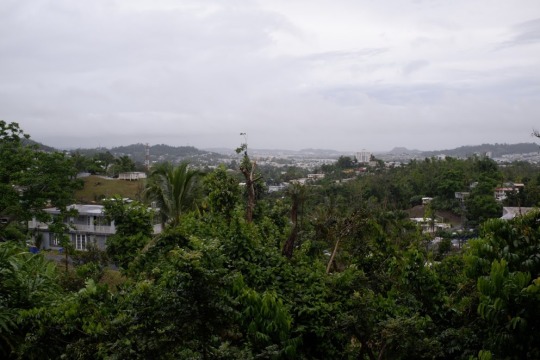
Recently, I found myself interpreting something from English to Spanish without realizing the person I was “doing the favor for” spoke English. I assumed, and you know what happens when you do that (you make an ass out of you and me).
Since Hurricanes Irma and María hit Puerto Rico, an uncountable amount of volunteers have arrived to work on the recovery efforts. In the midst of a disaster like this, we definitely need more hands if we want to get back on track quickly. People could definitely use some human power and financial support when it comes to rebuilding materials. However, if those hands aren't intentional enough you can find a list of challenges of what the experience will bring.
Is your week really beneficial for the community? Was the week as meaningful for the locals as it was for you after your cultural immersion? Will you allow people to walk around your neighborhood and take pictures of your house without asking? Did you listened to what had priority for the locals?
Since I moved back, I’ve been involved with recovery efforts through the Presbiterio de San Juan (body that gathers 15 Presbyterian congregations on the north and northeast region, part of the Presbyterian Church (USA)). Teams representing churches from all over the USA have been coming to Puerto Rico, and PCUSA -through the Presbyterian Disaster Assistance- is one of them.
Something that constantly troubles me is the lack of research people do before coming here. The basics are: “Puerto Rico is a U.S. territory and I don’t need a passport”, and then they book a flight. I do acknowledge they come with hearts of service and love, really looking forward to contribute as much as they can in the recovery efforts, but their intentions -many times- are misguided and misinformed (same happened in Miami where I led service trips, and many other places). Constantly, mission groups or volunteers will come with their own agendas about what they want to accomplish instead of listening to what the priority needs are and how they can contribute to those, on the first place. Many times I’ve pushed back with “this is what we really need (in the specific communities where we are)” because before the groups contact us they’ve already established what they want to do. If we walk into a foreign land and say “this is what it needs to be done because its better for everyone” and the locals have no saying, our mission trip is just as colonizing as the US troops that invaded Puerto Rico in 1898.
I am not, by any means, expecting everyone to know everything. I am the first one that can’t answer every single question about Puerto Rico, especially detailed explanations about the debt crisis. Nevertheless, it has been interesting to see some people realize how complex the political status is, or are even surprised Spanish is the language spoken everywhere, after they arrive. The expectations some volunteers have when they come show nothing else but lack of awareness and knowledge about the place they come “to help”, many times influenced by what they see in the news but not looking any further. I was recently asked about Puerto Rico’s political status and got a blank stare from everyone when I kept going trying to explain how the political status conversation looks like in Puerto Rico and how we lack of power to decide our own destiny.
Coming to Puerto Rico for disaster relief can’t be something you do out of the blue. This needs to be a conversation. We should always prioritize the needs of the community over whatever the volunteers want, even if it doesn't sound as majestic as building a hospital. Few weeks ago, I heard at a volunteer organizations meeting: “Saving kids from rivers isn't the task anymore. Now we need help with more mundane things like cleaning debris and/or painting”. We truly cherish and appreciate the people that take their own resources and come. This doesn’t mean we can’t be intentional matching skills with needs but many times some of our projects stay on hold because nobody is thrilled to do it. The conversation needs to take time. This can’t -or shouldn't- be on a rush because the groups have a date for their trip. It would’ve been so easy to ask the person of my very first story here: Do you want me to interpret to Spanish? and have her decide. Locals need to lead, volunteers need to listen, and mission teams really need to get educated before arriving to their worksite. Being myself a control freak, I understand how the lack of control brings anxiety, but it is responsible to yield the power to lead to someone who knows way more about where we are.
Several months ago, we took a group to Loíza, a municipality in the northeast coast. When we arrived, I asked someone where we could find a restroom and they offered their house (still covered with a blue tarp and roof leaks) for all of us. We learned from one of the neighbors he was playing Bomba at a restaurant few blocks away and headed there to see them. When we showed up we found out it was cancelled. This was not a tourist destination, and I highly doubt our group would've gone on their own. I know it was uncomfortable for many to not understand what was going on, going from place to place and feeling all the eyes on them, but we insisted to stay. We did. Even though the event was cancelled, I explained we had a mission team and we really wanted them to see what Bomba was about. And right there, on the sidewalk next to the restaurant, they set up the tambores, called another guy from the neighborhood (literally yelled his name so he could hear them at his house a block away), and played just for us. People from the neighborhood came and danced, showing our volunteers a piece of who we are. The group got to witness this after really stretching their trust on us.
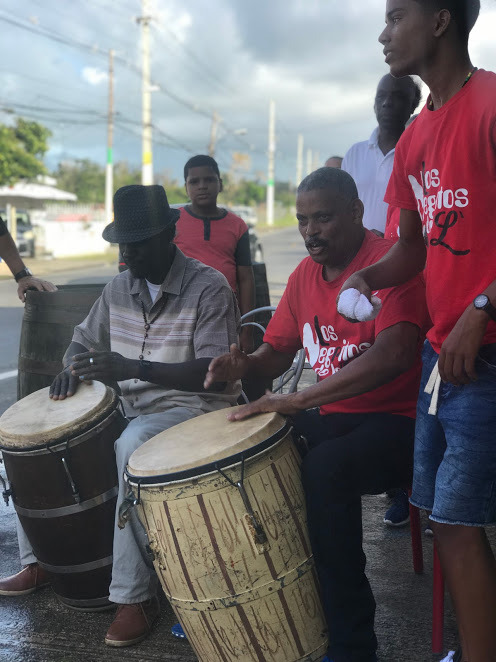
Partnership takes time, and sometimes is at the stake of one or both parts’ discomfort. Although it takes two to have a relationship, in a dynamic like disaster relief, locals really need to be the leading voice. If the mission trip serves as the conversation starter in your congregation about broader issues in Puerto Rico, so be it, but don’t plan a mission trip just to put a checkmark on your mission outreach committee. When you plan your trip, also have in mind that this will bring other opportunities and responsibilities to keep in the loop.
We don’t need charities. We need advocates, and advocacy is a commitment that takes longer than a week of mission.
2 notes
·
View notes
Text
Puerto Rico (¿) se levanta (?)
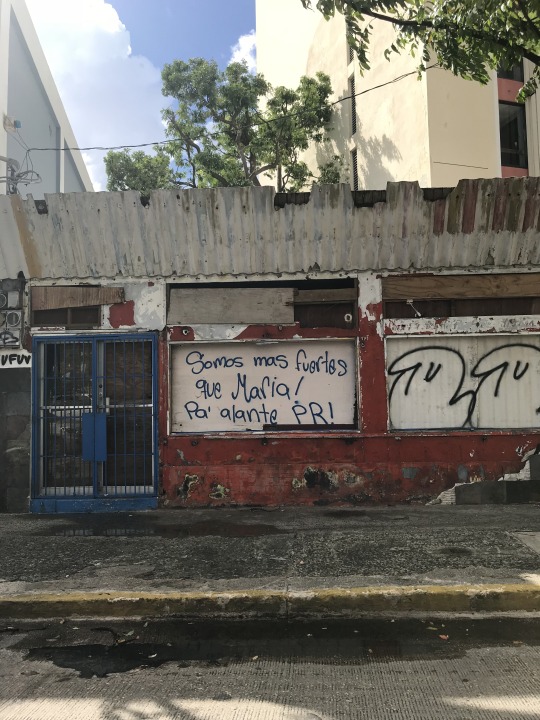
En todos lados escucho opiniones encontradas sobre el slogan que surgió luego que María descoñetara la Isla. Los “hay que tener buena actitud y fe” chocan con “mira el tapón, mira la gente... pirti rici si livinti”. Claro, yo acabo de llegar y ahora las cosas “se ven bien ya”.
Hace unos días atrás, un amigo me dijo que “Puerto Rico se levanta cada vez que un puertorriqueño se levanta con la actitud de hacer algo por su Isla”. Y eso lo entiendo, él tiene razón. Si uno no pone de su parte no podemos esperar mejores resultados colectivos, pero después llegué al cruce de la Avenida Lomas Verdes con la calle Paraná y me pregunté si Cupey quedaba más abajo del boquete en el que quedó el País.
Usualmente, yo soy súper positiva pero ver cómo sigue Puerto Rico, a 3 meses del huracán, frustra a cualquiera. Yo no esperaba ver todo arreglado pero no voy a negar que las fotos en Facebook no le hacen justicia a nada. Sin embargo, también escucho cuando me dicen “chacha, ya esto está verde” y pienso en lo que hemos recobrado. Los otros días pasé por Ocean Park y todavía se ve la línea en algunas casas por donde llegó el agua. Nada más pensar que donde yo estaba transitando libremente estuvo completamente inundado por semanas me hizo reflexionar en que -quizás- lo peor ya pasó.
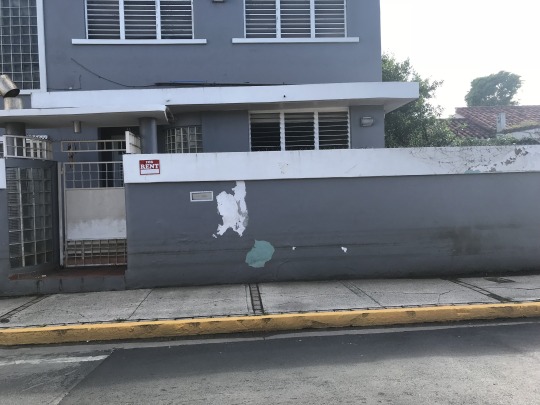
En la historia, sin importar el tema, vemos que siempre están los que aseguran: “mira todo lo que hemos avanzado”, y otros que responden que “todavía falta”. Aunque muchas veces podríamos encajonarlos en “optimistas” y “pesimistas” hay que prestarle atención a ambos y sus respectivas realidades. Es bien fácil decir que la cosa está mejorando cuando ya tienes luz y agua en tu casa, o cuándo tienes más opciones en el menú del restaurante que visitas (comparando con el papel escrito a mano que te daban en Octubre), pero para la gente que no tienen con qué pagar la plantita eléctrica, tienen que gastar chavos en comida todos los días o dependen de máquinas para manejar problemas de salud, pues... la cosa está mas apretá'.
Yo creo que Puerto Rico mas que levantarse, respira... poco a poco. No puedo ignorar que lo que pasó fue un desastre a gran escala y no una simple vaguada. Aquí hay un antes y un después de María. Podemos ver los rayitos de sol (¡disfrutarlos y celebrarlos!) sin olvidar que todavía llueve y se inunda en algunos lugares. En casa (que no ha llegado la luz) nos prestaron una planta y la nevera no prendió. Hay días en los que podemos ver como han reverdecido los árboles, y otros donde veremos más escombros y semáforos apagados y nos amargaremos con Carmen Yulín aunque estemos en Guaynabo. Aquí hay que respirar profundo por un buen tiempo y tomarse un cafecito todas las mañanas.
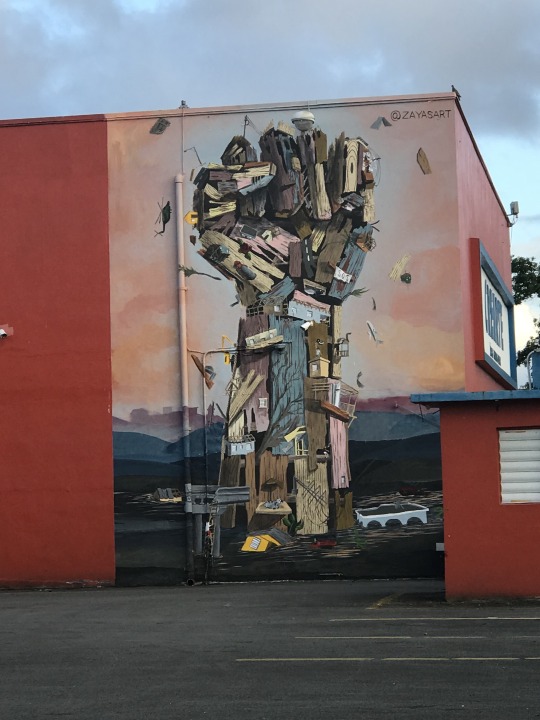
(mural por David Zayas)
0 notes
Text
Light

Last September 19th, I flew back to Miami knowing what was coming to Puerto Rico the next day was going to be devastating. I left with a sense of guilt and sorrow after two intense weeks for me and my family, but a broken window and flooded apartment were waiting for me (thanks Irma!). I also left San Juan without knowing I was going to be back less than 3 months later. On September 20th, María happened. I’ve seen a lot of stuff on Facebook, read articles and spoke with friends and family but, believe it or not, I can still see how Puerto Rico was affected even 3 months later.
Many of my friends have been without electricity since September 20th (including my home in Cupey), but others have been without electricity since September 6th (hurricane Irma). Although coming home now was a needed time of transition for me, I knew I was coming to a different place from what I saw through my plane window last September 19th.
Last week, my UBER driver shared how much money he’d spent using his generator and how his wife was moving temporarily to the States for medical reasons (first time in 51 years they were going to be apart!). Other UBER driver shared how his home security company has been affected due to lack of electricity and how he’s driving for UBER for a while until electricity is restored. Another driver (yes… my car was at the mechanic for few days) shared with me how traffic has been affected due to broken stoplights. I can see some debris, broken stoplights, signs, or fallen trees and say “wow” to get the following response from whoever is next to me: “this is looking great now!”. I could also talk about how you can see the stars from the roof of my house because there’s not that much light pollution. I guess it’s all about perspective and attitude.
In the midst of Christmas season, is inevitable to reflect around lights. From Christmas decorations, trees, all the way to reflections about the meaning of Christmas and the “Light of the World”, how can you think about Christmas without lights, right?
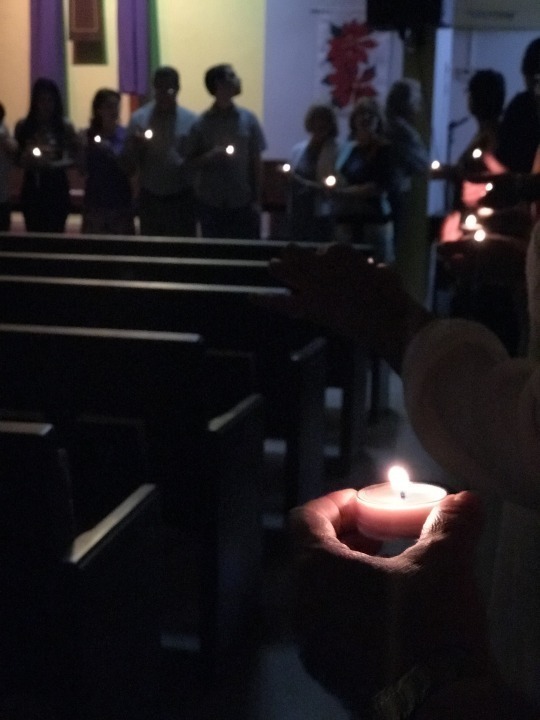
Yesterday, I went to the church I grew up at. Electricity was fully restored this past week. During the kid’s sermon the topic was around Christmas lights and its meanings during this season. For a second, me being silly and thinking about how weak the electric system is here, I thought “what if they plug the Christmas tree and the whole church goes dark?” Thankfully, that didn’t happen. (Yay! Christmas spirit!)
During my transition back to Puerto Rico, I’ve been reflecting on dark times in my life but also silver linings; what makes me smile in the midst of hard times but also those “light-at-the-end-of-the-tunnel” moments. We think of light and we think of hope, and talking about light takes a whole new meaning in Puerto Rico.
A friend recently told me that when the electricity got back to her neighborhood people started cheering like there was a block party. How is it possible that darkness can last for so long? However, when those thoughts were coming to me yesterday, I looked next to me and saw my 8-year-old friend Fiorella showing me what she did during Sunday School and telling me: “let’s build the manger out of legos!” …and -just right there- in the midst of my hurricane aftermath, I smiled and thought to myself “this is looking great now”.

0 notes
Text
Disconnection
Hurricane María devastated Puerto Rico. One month later (without forgetting Puerto Rico was hit by Hurricane Irma two weeks before María), most of the island still has no electricity and many are still without water service. During those first weeks after María hit, I would wake up and -for a second- wish everything was just a bad dream. I would then open my Facebook app and realized -once again- it wasn't. That first week, I would go to restaurants and hear people talking about it, and I run into my neighbors who quickly asked about my family.
I was in Puerto Rico when Irma hit (September 6) and when I left Puerto Rico (September 19th morning) I felt guilty. I had to return to Miami to deal with my flooded apartment after Hurricane Irma also hit Florida. I knew the threat of Hurricane María was serious and, as my flight was taking off, I was questioning myself if I was prioritizing a broken window over the safety of my own family. I was terrified about what could happen while I was away. That night was a long night (ask Sofía who had to help me clean the mess at my apartment so we could stay there! thank you, Sof!). Although my mom had phone service most of the time, the very last picture I saw coming from my best friend Keishla was her glass sliding door uncovered after the wood panel flew away -due to the winds- even before the worst part hit. We didn’t hear from her for 2 days. Phone service was 100% down.
However, even though my Facebook feed has been all about Puerto Rico, I have friends in the mainland (non-Puerto Ricans) who are completely disconnected from what’s happening. More than once -in the past few weeks- I’ve been told: “I just haven't been following up what’s going on (in Puerto Rico).” A lot of people did see the president throwing paper towel to Puerto Ricans... but that’s it.
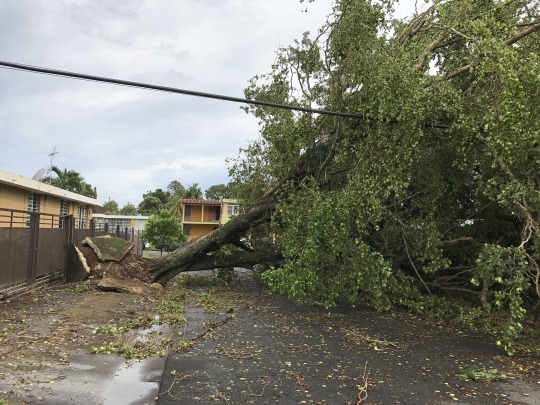
(Fallen tree on my street after hurricane Irma... yep... not María.)
My friend Sofía was stranded in Miami after not being able to fly back home after attending a meeting in North Carolina. She ended up staying for 1 week and a half. Two days before she was able to fly back, she got a phone call -for the first time after the hurricane hit- from her boyfriend who lives in the southwest region of the island. Since September 20th, I kept texting and calling friends all across the island without getting any response. That week many of us in the diaspora kept asking each other the same question: “Have you been able to talk with your family?”
The morning of September 20th few local journalists started posting videos about the devastation. I had voice messages on my phone from friends where I could literally hear the strong winds. I was able to follow a Facebook Live video where I could see my neighborhood of Cupey. The deep sadness I still feel, even writing this a month later, is inexplicable.
I’ve been reading and watching a lot of videos about this, from [North] American press coverages (s/o to CBS’ David Begnaud) to videos posted by locals... from pictures of devastation to videos of people drinking local beer in a destroyed bar...from local press conferences to the interviews of the “Nasty” San Juan Mayor. I’ve been listening to Puerto Rican radio and I’ve also had the opportunity to -after few weeks- talk with people in the Island. Although we are definitely resilient and want Puerto Rico que se levante, I can sense a deep sadness and frustration. But it feels like -in the mainland- people in general do not understand what’s going on on a bigger scale.
“In 1898, American troops invaded Puerto Rico...” “...Puerto Ricans didn’t invite the United States Armed Forces. It was invaded, so with that invasion comes responsibility”. Rep. Nydia Velázquez could've not said it better during a hearing where she demanded urgency with what was going on in Puerto Rico:
https://www.facebook.com/CSPAN/videos/10156114246015579/
I often wonder if we really need to constantly bring up our citizenship to have a valid demand of aid and support from the US, or if is it that the US keeps forgetting we aren't allowed to get aid from any other country (see Jones Act).
There is a humanitarian crisis where basic needs are just not met, US Government keeps bragging about the “great things they do” (PR Governor seems to be the only one who agrees, es un caga’o), while people are literally dying in hospitals and houses. At the same time, people in the US continue their lives without a minimal concern about how their government is failing other people. I can’t have that privilege and luxury of being disconnected. We are talking about my people. I care and I am upset the people that live next to me don’t.
Yesterday, I was able to talk on the phone with my best friend Keishla for a little bit over an hour. In over a month, we haven't been able to talk for more than 10 minutes, and it felt like an accomplishment... like one step closer to “normality” (normality meaning being able to talk without any limitations... and I know that that sounds weird and unnecessary. I’ve also been thinking a lot in the complains I hear from [North] Americans with even more stupid stuff! So... there’s that).
However, there is a lot more to do. Puerto Rico’s struggles, economic disparity and lack of access to resources didn’t start after María, but centuries of colonization are surely on the spotlight right now after the weak response in a dire situation like this.
1 note
·
View note
Text
Ego
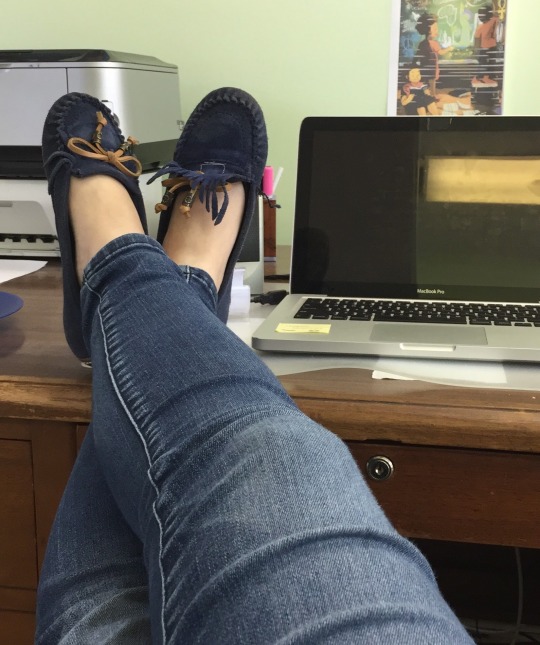
Hace tiempo no escribo por aquí y no es por falta de tema, quizás por pachó de sobra. Acabo de checkiar los drafts aquí en mi blog y tengo 17. 17! Pero hoy empiezo con uno nuevo, que es más un desahogo que algo bien elocuente (como si los demás fueran ensayos de Malala!).
Yo me quedo boba cuando leo Facebook y veo lo mucho que la gente le gusta suplicar likes a todo lo que da. Desde “miren lo flacx que estoy”, “miren lo que me voy a comer” hasta “conozcan todas 'mis obras'”. Sin olvidar los Jay Fonsecas de la vida que comentan hasta en la foto de un pan sobao y critican si son de Kasalta, de los Cidrines, de la Panadería El Señorial (la mejor avena de Cupey!) o de Moncho Pan. (uy... noten todas estas referencias del área metro)
En un research bien intencional que hice en Google dice que “ego” es la “valoración excesiva de uno mismo”. Y, aunque yo me canto culpable de postear cosas y después ver quién le dio like, a veces veo posts que me tientan a crear una página de troll y contestarle como realmente quisiera. Pero miren, como me recuerda todos los días la que me parió: “que yo soy una muchacha de Iglesia y tengo que dar el ejemplo.”
Miren, yo soy de las que le doy like a cosas desde posts de justicia social hasta memes de Tata Charbonier y videos de gatitos. Como digo siempre en los kareokes: esto es pa’ vacilar na’ mas (por aquello de que los que cantan de verdad se controlen de ser overachievers), pero veo que algunos se toman bien en serio lo de hacerse famosos y volverse virales. Y si me amargo con esto de pescar likes más me amarga ir a la sección de comentarios y ver los “wow, que gran ejemplo eres para el universo”. ¿Seré yo la única que se amarga?
Ayer mi estilista me dijo: “Cuando alguien viene con vibras malas, yo le echo azúcar por encima y sigo caminando.” Perdónenme desde ya si paso por su página y tiro un emplaste de frosting.
Yo sigo aquí con mis matitas (que no están en Facebook) pero las quiero mucho y me dan mucha paz.
1 note
·
View note
Text
English is not my first
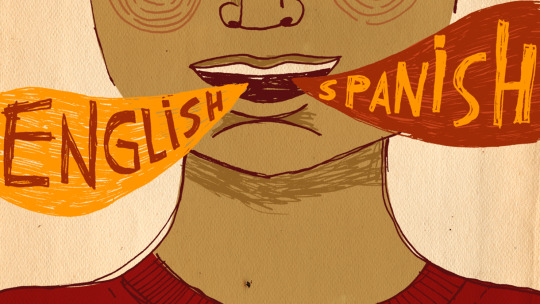
There hasn’t been one day I wake up where I don’t remember I’m speaking English as a second language. There is no day I go to work without thinking I have to encounter people coming from a different cultural background. Although some days are more fun than others, a constant reflection I struggle with is when should I say something?
I’m writing this blog after -literally around 10 minutes ago- seeing a Facebook post that said: “In the hospital if English is not your first I prefer to be your last”. This is not a comment I saw on a random feed or by a random person. I saw this on my personal feed because I’m friends with the person who wrote it.
This is not the first time I see this type of post, but it made me wonder how many times people have thought the same after I say something, how many groups that come to Miami to do ‘mission’ trips underestimate me as soon as they arrive and I start orientation. How many people in church, yep… in my beloved Presbyterian Church of the ‘United’ States of America, look down on me because “English is not my first” and prefer someone else to take the lead on something.
That is something all of us, regardless of what our native tongue is, have to deal with on a daily basis. Some people compliment our English measuring the thickness of our accent instead of our vocabulary. Others, make fun of the way “we say things”. Recently, a friend told me about someone who asked her to “say something funny”.

It’s frustrating to read this post while drinking my morning coffee and then have a positive attitude towards the rest of the day.
As much as I try to remind myself that I’m fully bilingual, and that I’m able to identify other languages even if I don’t speak them, comments like this remind me how messed up things are. How language holds power. We go back to the “We are in America, we speak English here” rhetoric. (Side note: Please, stop referring to the US of A as “America”.)
I’ve written about this before. There is no navy blue passport that prevents me from knowing I am a foreigner in this land. I would really like to curse in Spanish, but I’m done drinking my café con leche straight from Utuado, Puerto Rico. I’m better now.
2 notes
·
View notes
Text
Life experiences
A couple of years ago, I was telling a group leader that we had too much leftovers from the night before and that we would be eating the same thing that evening. Her response: “Oh ok, that’s fine. It will be a life experience for them…”.
After moving from Puerto Rico to the States, one of the things I’ve deeply reflected on has been “privilege”. It wasn’t until I moved here that I fully understood what that word meant. Something I’ve shared before is realizing what it meant to be a foreigner, regardless of the navy blue passport I still carry every time I travel. I’ve realized I have access to things that aren’t available for everyone. Rather than feel “blessed”, I felt (and still do feel) guilty. Why is it that I can relate so much with people around me, but at the same time be so naive and ignorant about the struggles that they face and I don’t?
However, I’ve also realized how I’m also in a position where I don’t have access to certain things because of my identity as a person of color – an identity which I embrace –in the ‘United’ States of America.
Last night, I heard a conversation that left me thinking. The topic: a broken dishwasher and people that “had to wash their dishes by hand”, as if it was a tragedy.
I, by no means, want to make a pity face, but I’ve never had a dishwasher. I was confused when almost everybody agreed that this was a horrible thing to happen. I wasn’t going to share at the table and be the Debbie Downer of the conversation, but, in my house, the plates have always been washed by hand.
Rather than feel bad about it, or ashamed – like I have felt about topics way deeper than a broken dishwasher – I realized how different people’s worlds are, how different our experiences are, and how differently we face conflicts and struggles.
I’ve found that most of my life is full of what others consider to be “life experiences”, and that perhaps the struggles of some aren’t even on my radar.
I hope I can continue to realize in what ways I am privileged, while also becoming more of aware of the ways that I am not.
2 notes
·
View notes
Text
Holy ground
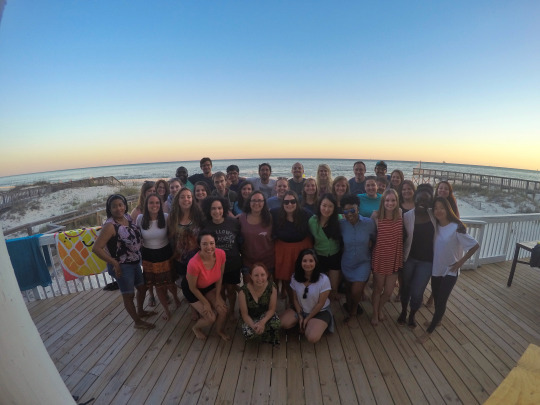
Sometimes, it’s not until you get away from the noise that you realize how much you needed a break. For the third year in a row, I spent a weekend with other yearlong volunteers serving -through DOOR and YAV- in Asheville, Atlanta, Nashville, New Orleans and Little Rock.
This was a time to reflect in the year so far, while also having fun and relaxing. It was good to see them sharing stories, from meaningful experiences all the way to awkward and uncomfortable ones. There was space to listen and space to speak. A space to sing, and space to dance. There was also a lot of space for laughter and fellowship.
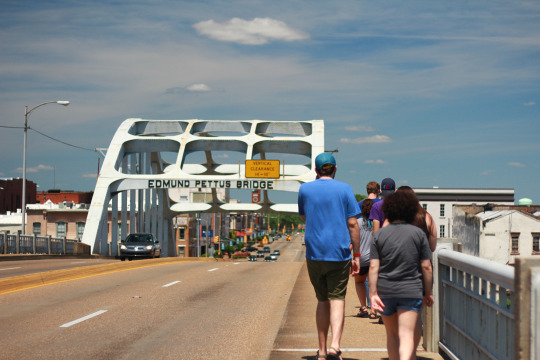
After our retreat, we headed north to Selma, AL, where we reflected with the Nashville YAVs about the historic importance of this place. Overwhelming and deep reflections happened while we were there. I personally thought about God speaking to Moses: “…for the place where you’re standing is holy ground. (Acts 7:33)”, at the same time I walked across a deteriorated bridge that was acknowledged as a historic landmark less than 3 years ago.
It was a good time to rest and have fun, but also a time that challenged us to remember there’s a lot of work to do still. There’re a lot of underestimated, unacknowledged, and deteriorated holy grounds.
For the place where we are standing is holy ground. What are we called to do now?
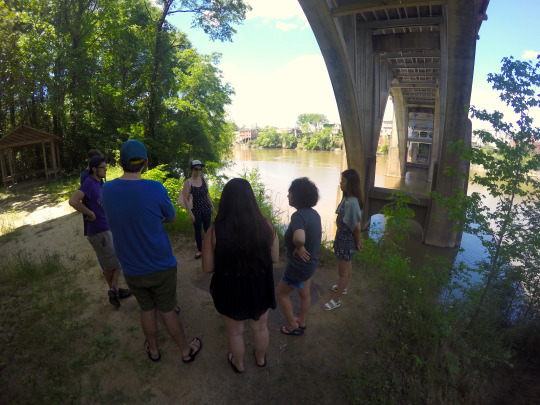
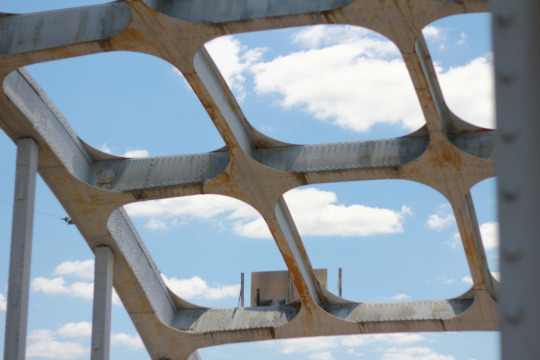
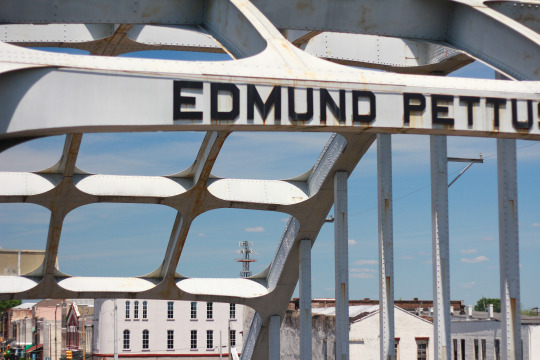
1 note
·
View note
Text
ESL
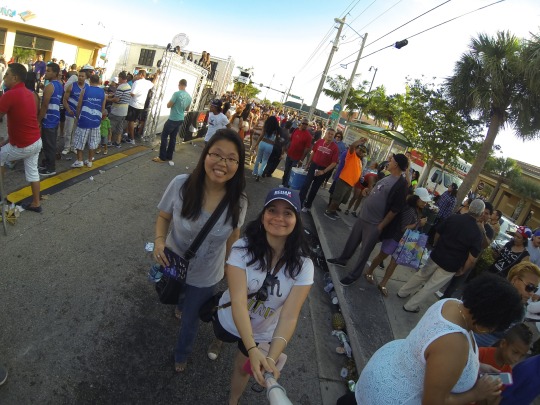
I speak English as a Second Language. Born and raised in Puerto Rico, I had to take English classes in school and college, but yet spoke Spanish -with Puerto Rican slang included- with the people around me.
Couple of days ago, my friend Quinten was telling me how Henry -coworker born in Nicaragua- called any type of cereal “conflei” (Spanish pronunciation for Corn Flakes). Same happens with the Puerto Rican slang where you’ll find a lot of English words either conjugated in Spanish, or just in Spanish pronunciation. That’s why I also eat “conflei”.
Being bilingual is certainly an asset, but speaking a second language will always bring some sort of struggle.
Since I moved to the US, I’ve found myself many times trying to share something and not finding the proper words for it. It’s frustrating. It’s not only about being able to speak a language, but it’s also understanding context, culture. It’s being able to jump in during a conversation in a different language than the one you’re used to be thinking in. The frustration may come for not remembering a single word, or just the fact of not being able to say what you want.
I remember during my YAV year feeling powerless when I wanted to say something and it would first come out in Spanish. By the time I was able to organize my thoughts (in English)... well.. it was already too late. This happened from silly comments, jokes and reactions, all the way to deep reflection and disappointments. I wished I could engage better in conversations and not being seen as the quiet girl in the corner, which was not only struggling with the language barrier, but with her own self.
Last October, I visited Colombia and ended up joking with one of the YAVs about that same struggle. I started laughing when she told me: “I always say ‘I’m way funnier in English!’”, because that’s exactly what I thought every single time I said something and didn’t come out the way I wanted: “I promise I’m funnier in Spanish”.
Through experiences like that I’ve seen how language can be an excuse for segregation and division. Those who speak the same language will set aside from those you don’t. It’s uncomfortable to cross over to the other side. Besides the words, language carries culture, traditions, identity. Even in Colombia, I found myself reading menus at restaurants and having no idea what they meant! ...and that was in Spanish! It took a while to learn some slang and understand what they were talking about. That’s why I think language could be seen as a barrier, but it could also become a bridge; but... hey, the bridge needs to be built.
I’ve been around the Miami area since 2013, and I love how I can witness the intersection between English and Spanish in this city. If I walk in to a place, look around, and see Spanish-speaking people, I will automatically speak in Spanish. It’s nice to have people hear me and quickly identify where I am from (...vaya, ¡tu eres boricua!). It’s great to talk to people and suddenly switch the conversation to Spanish in the second we both realize we are native Spanish speakers. Regardless of where we are from, it’s good to find home in language.
I’ve been thinking a lot about this during these past months. I always ask God that regardless of the time I spend in the US, I don't get used to speak English on a daily basis to the point where I forget the struggle. I find myself learning about this and finding other little homes in language (even if it isn’t Spanish).
Going back to my YAV year, I spent a lot of time with my roommate Suyeon. She was born in Korea, and have been living in the US for half of her life. I would help her with Spanish classes homework, and would take the advantage to also ask her about Korean culture.
Just to be clear, I knew near to nothing about Korea. One of my few references was a Korean congregation that used to meet at my home church in San Juan after our worship service. Another one, the Gangnam Style. (I know... I’m sorry... will never bring this up again). That was all I knew.
We would constantly ask how to say different words in Spanish and Korean. I remember one day she asked me how to say “chopsticks” in Spanish. I thought about it and felt ashamed almost immediately. In Puerto Rico we would say “palitos chinos” which literally translates to “Chinese little sticks”. I apologized for a long time (Well...I still do!). That conversation helped me realize how I generalized around Asian culture without even being aware. During conversations like this I understood the power of language in culture and identity. I could identify differences (between my culture and Suyeon’s) but also found out similarities. I celebrated every time I could pronounce something right, and get frustrated when I couldn't even say “I’m frustrated” in Korean! I learned about Korea, about Suyeon’s home, through their language and through her eyes. When she asked me about Spanish words I would usually say: “Well, the proper Spanish word would be this one, but in Puerto Rico we would say it like this”. I hope she learned about Puerto Rico as much as I learned about Korea! We were far away from each other when it came to heritage, but learning about each other’s first language and culture truly made us connect.
Almost 2 years later, by the end of 2015, I was sitting next to Shinhye (YAV in Miami through the Korean YAV Site exchange) at a Presbytery meeting (regional church meeting). We were listening to a Korean candidate to ministry while he answered some questions from Pastors and commissioners. He shared a little bit about his journey and call about coming all the way from Korea to Miami to go to Seminary and do ministry here. He shared that one of the struggles he knew he was facing was definitely language. I heard him and looked at Shinhye, looked at the guy, and said (almost whispering): “Oh I hear ya’. You’re not alone, brother”. Shinhye took a deep breath and reaffirmed my words. I looked up and said: Help us 하나님 (God)! We both laughed, and for one second I felt so close to them.
Just right there... there was a bridge.
1 note
·
View note
Text
Dios no sanó a mi papá
Click for English version
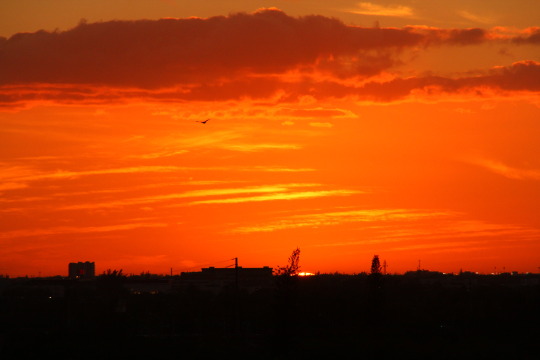
Un día como hoy, hace diez años, vi a mi papá respirar por última vez. Recuerdo todo como si hubiera sido ayer, y no es hasta hoy que soy lo suficientemente valiente para escribir sobre ello.
Fue difícil vivir esto tres semanas antes de mi cumpleaños 19 y apenas empezando mi segundo año de universidad. Fue difícil notar por primera vez, varios meses antes, que se le estaba cayendo el pelo. Pero lo más difícil pasó varios meses después. Mi comportamiento fue afectado por cambios de humor y -después de no querer ir- terminé en la oficina de un psicólogo. Me tomó un tiempo recuperarme emocionalmente (por aquello de asumir que estoy completamente recuperada hoy).
A través de estos 10 años también he tenido que bregar con comentarios hechos por personas que claramente no han experimentado a nadie con cáncer cerca de ellos. Burlándose de lo flacos y enfermos que se ven en el internet, sin comprender como cada comentario tocaba una cicatriz con la que yo no quería bregar; comentarios que no eran dirigidos directamente a mi pero que me transportaban en el tiempo a un lugar de un profundo luto.
Ahora, mientras cada día soy bombardeada con artículos sobre libertad religiosa, creencias y la Iglesia, comencé a reflexionar sobre mi fe durante esos años.
Mi papá era cristiano y se aprovechó de cada oportunidad que tenía para compartir su testimonio. Yo lo recuerdo comentando una y otra vez: “el milagro está hecho”. Me tomó un tiempo caer en cuenta de que él no se refería a un milagro físico.
Las quimioterapias y radioterapias fueron extenuantes. Mi familia estaba extenuada y, claro que oramos. Oramos un montón.
Sin embargo, algunos cristianos pueden pensar que experimentar sanidad física luego de sufrir de una enfermedad cruel es la única manera en que Dios transforma y muestra Su poder. Ahora, si eso no pasa, le cuestionamos a Dios. Mi papá me enseño que eso no es cierto. Ni una sola vez le he preguntado a Dios por qué pasó esto pues mi papá me enseñó sobre el propósito durante este proceso.
Mi papá no sanó (físicamente), pero el estaba sano internamente. Yo vi eso, fui testigo de ello y fui influenciada por él. Al principio, cuando decidió parar el tratamiento, sentí que se estaba rindiendo, que estaba renunciando. Fue difícil para mi entender el concepto de “calidad de vida vs. cantidad”. Pero él fue lo suficientemente valiente como para tomar una decisión como esa y definitivamente retó mi fe.
Claro que lo extraño. Claro que quisiera compartirle mis cosas. Y, claro que pienso que no me “está cuidando desde el cielo”. (necesitaba un comentario sarcástico en alguna parte). Claro que me entristezco cada Día de Padres. Claro que la palabra cáncer todavía me repugna. Y, claro que cada 13 de septiembre me recuerda esa mañana de un martes en el 2005.
Pero también recuerdo y celebro su sonrisa, su risa, sus sorpresas, su dedicación, su amor. Recuerdo cuánto me parezco a Gabriel Muñiz y cómo aspiro a, algún día, ser tal como él.
Cuando él hablaba de ese milagro, siempre estuvo en paz y (luego de 10 años), yo también.
1 note
·
View note
Text
God didn’t heal my dad
Click para versión en español
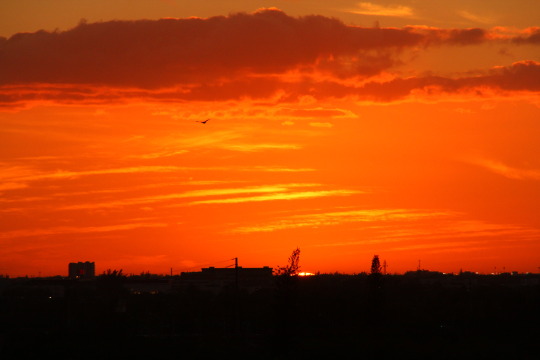
Ten years ago today, I saw my dad taking his very last breath. I remember everything like it was yesterday and it’s not until today that I am bold enough to write about it.
It was difficult to experience this 3 weeks before my 19th birthday, and just starting my second year of college. It was difficult to notice several months before, for the first time, he was loosing his hair. But the most difficult part was definitely couple of months later. Mood swings started affecting my behavior and -after not willing for a long time- I ended up going to a psychologist. It took me a while to get completely back on my feet emotionally (assuming I’m back on my feet now).
Throughout these 10 years I’ve also had to deal with comments made by people that clearly haven’t experienced cancer close to them, mocking how thin and ill people look on the internet without understanding how every comment was scratching a scar I didn’t want to deal with. Comments that weren’t directed to me but took me back in time to a place of deep mourn.
Now, while bombarded every day with articles about religious freedom, beliefs and Church, I started reflecting about my faith through those years.
My dad was a Christian and he used every opportunity to share his testimony. I remember him repeating the phrase “the miracle is completed”, over and over again. It took me a while to realize he wasn’t talking about a physical miracle.
Chemo and radiotherapies were exhausting. My family was exhausted in every way, and of course we prayed. We prayed a lot.
However, some Christians may think that experiencing physical healing after suffering from an cruel illness is the only way God can transform and show God’s power. Now, if that does’t happen, we question God. My dad taught me that’s not true. Not once I’ve asked God why this happened because my dad taught me about purpose through this process.
My dad wasn’t healed (physically), but he was healthy internally. I witnessed that, I experienced it and I was influenced by him. At first, when he decided to stop his treatment I felt he was surrending, I thought he was quitting. It was hard for me to understand the whole “life quality vs. life quantity”. But he was brave enough to make a decision like that. He definitely challenged my faith.
Of course, I miss him. Of course, I would like to share things about my life with him. And, of course, I don’t think he’s “taking care of me from heaven”(I needed a sarcastic comment at some point). Of course, I mourn every Father’s day. Of course, the word cancer still makes me cringe. Of course, every September 13th reminds me of that Tuesday morning back in 2005.
But I also remember and celebrate his smile, his laughter, his surprises, his dedication, his love. I remember how alike I am to Gabriel Muñiz and how I look up to some day be just like him.
When he spoke about that miracle, he was always in peace, and (after 10 years) so am I.
2 notes
·
View notes
Text
Listen
I’m exhausted and overwhelmed. In the past week I’ve had many conversations about racism. Charleston shooting was, once again, a reminder of one ugly truth about our society: racism is real and present. People still feel entitled to mistreat others just for the way they are.
Yesterday talking with the YAVs, I was sharing that one thing I’ve learned is that I can’t talk about something I haven’t been exposed to. If I haven’t had the chance to experience diversity or learn about it, I won’t be aware of the influence it has. If I don’t learn about what happened in Charleston, SC (among a lot of other examples), I may not be completely aware of the concerning race issue in the United States. If I hadn’t the opportunity to live in Little Haiti, I would say -like 95% of the Miamians- that it’s a sketchy dangerous neighborhood where I shouldn’t go…. ever.
This remind me the challenging and exceptional TED talk by Chimamanda Ngozi Adichie about the Danger of the Single Stories. Oh, how much stuff we still don’t get. We center our beliefs and thoughts in the only part of the story we know. We don’t even care about someone else’s story because, if we assume we’re right, we know they are wrong. Or, we don’t even know there is another part of the story.
Lately, there’s no even space for conversations. We judge. We put requirements and labels to people and WE decide wether they’re worthy of our approval and God’s grace. I’m tired of that.
And, as if speaking about racism and privilege isn’t emotionally heavy enough, I have seen too many “Christians” using every text character available in their social networks to share their homophobic thoughts about the Supreme Court decision about marriage.
I grew up in a conservative church environment, and I still struggle defining where I am in that “liberal-and-conservative” spectrum, but I know I’m leaning towards the conservative side. However, I’ve had conversations that have shaped my faith. I’ve had a community that has guided me and challenged me about what I really believe and how those beliefs reflect in and for the community around me. I’ve been challenged in how I apply some Bible verses (in my life) and others I don’t. In that process I’ve found myself reaffirming some points of views, but also I’ve seen my faith being shifted and transformed. And, if I can be honest, I feel completely in peace with that.
With those who disagree with the Supreme Court decision, that’s fine. There is space for that too. I’m not suggesting to be silent (we definitely need to share our thoughts -specially in church), but to create spaces for conversations before throwing out some Bible verses just to make your point of how THEY ARE WRONG and the “world is coming to an end”. I also understand that many aren’t celebrating. Many are deeply mourning and we should remember that too.
That’s why diversity -in any way- is a great opportunity to learn. We can learn from others in the same way others can learn from us. Isn’t that the purpose of a community? Sharing?
A community, specially a community of faith, should be willing to listen. That does not mean to agree or disagree, but to show respect and care for one another. I completely agree with Hector words in “Hector and the search for happiness” movie: “Listening is loving”. But it’s hard to listen if we haven’t been in the oppressed side of the story. It’s hard to pay attention if we don’t know what it’s like to live with fear and shame. It’s hard to be compassionate if we don’t understand what it means to be rejected from those you love. We need a church full of compassion not a church that reserves the right of admission. The church has become a place for the privileged!
I believe that if Jesus was here right now, he will still be overturning tables at the churches and not at the Supreme Court.
May we take time to listen God’s voice through other people stories and be agents of love, regardless of anything.
1 note
·
View note
Text
Penthouse privilege
Last night I woke up twice because a car alarm went off at 3:00ish-am. For a moment I thought it was my car, so, I got my keys and got out of the apartment to double check.
Everything was ok but, on my way back, I looked at the other side of the parking lot and saw a guy walking around the cars and trying to break into one of them. I stood still for some minutes staring at him from the 10th floor. A car drove by and I saw how he hid behind one of the cars and started crawling away.
For a moment I thought: Should I just get back in the apartment? Will I get in trouble if I call the police? I mean, it wasn’t my car… so… was it my problem?
Well, 15-20 minutes later 3 police cars arrived and arrested the guy. I later learned that he actually broke into 6 cars. Cars owned by my own neighbors.
I’ve been brainstorming a lot during these past weeks about privilege.
What does privilege means?
What’s my responsibility when I realize I have privilege?
What if I don’t realize it at all? Who’s fault is it?
Is having awareness (of our own privilege) enough?
Few months ago I shared a blog post about my experience after visiting a Detention Center in Homestead, FL. That was a hard day for me. It was when I trully realized the weight of my passport, a privilege I wasn’t even aware of. That realization was challenging and uncomfortable, but, after all, what was I going to do with that?
Now, I’ve seen myself reflecting about my privilege in many ways. We may first think about money, but privilege is defined by how much access we have to things. Whatever it is. Money. Safety. Community. A Parent. Education. Car. Food. Facebook. A/C. Soap.
And again, what do I do with being aware? Should I go and advocate for every single person in the world that doesn’t have the same privilege I have? Should I retweet some hashtags? Should I stop buying stuff? Should I keep celebrating my religious freedom when I know there’s people dying because they lack of that same freedom? What’s the right thing to do?
There’s a campaign called #helpingfeelsgood which encourages people to support organizations… because…yeah… “it feels good”.
In a weird flashback, I remembered some stuff I learned during my 4 years in college in my Advertising courses. I can get super upset with the focus of this campaign but, if whoever leads this truly knows their target, there’s a lot we can say about it. Maybe we already got to the point that actually this is the only way people can be encourage to serve, to take care of others.
Being aware of our privilege shouldn’t be our final goal but the motivation to act and live differently. The big challenge doesn’t come when we realize “what we have and others don’t” but how we decide to experience and live in solidarity and compassion with others, regardless of their reality; regardless of our own reality.
After last night’s incident I reflected about other times in my life where I’ve been in a different position than others. I also reflected on different moments where others were in a privileged position and didn’t think about me. Can we find ourselves looking down from “far away” how others aren’t treated with justice and saying: “well, that’s not my problem”?
Definitely advocating, from a position of privilege, for others doesn’t mean to speak for the voiceless but to raise the voice of the unheard. And if I can use my privilege to help raising others people’s voice, so be it. If that means that I decide to modify the way I live and think, so be it.
May we have the opportunity not to only see injustices from a 10th floor but to remember that those who are affected, are actually our neighbors. And, that’s why we (regardless of how uncomfortable-scared-confused-etc. we may feel) definitely need to do something about it.
0 notes
Text
Incómoda
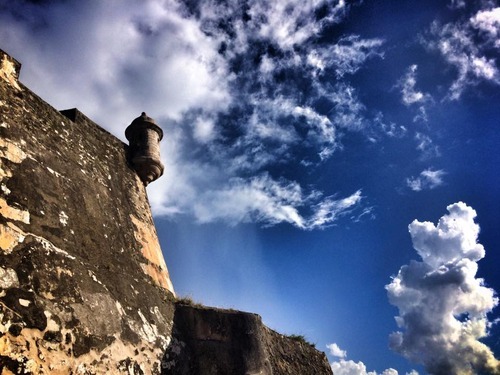
Hace algunas semanas compartí con un grupo de jóvenes lo siguiente:
Yo: “…pues quería compartirles que, a partir de enero, tengo trabajo.”
Ellos: (aplaudiendo y celebrando) “eeeeeeehh!!!”
Yo: “…pero, no es en Puerto Rico…”
Ellos: (tristes) “…ahhhh!”
Una de las jóvenes: “No importa. Vamos a celebrar comoquiera.”
Después de varios meses sin trabajar VOLUNTARIAMENTE, me llegó una oferta de trabajo. Yo no la busqué. Llegó.
Luego de servir en Miami a través del YAV Program, decidí tomarme un break de todo. Aunque muchos me criticaron y otros me miraban con cara de pena, de ”si tu lo dices”, yo necesitaba este break. Me afectó más el regresar que la misma experiencia fuera. Regresé con otra perspectiva y me encontré chocando con la perspectiva que yo tenía antes de irme.
Por eso fue bueno tomarme este espacio para poco a poco caer en tiempo y entender que mis experiencias no habían sido las mismas de los que me rodeaban. Que la verdad absoluta no la tengo yo. Y que, ciertamente, hay situaciones que ahora me afectan demasiado cuando antes me importaban lo mismo que me importa el reguetón (osea, nada).
En mi pasado blog compartí lo agridulce que había sido regresar pero, hoy puedo dar fe de que hice bien en venir a casa a descansar.
Definitivamente “there’s no place like home” y prefiero mil veces estar en mi casa aunque la grama del vecino del norte se vea más verde.
Ahora bien, yo sabía desde un principio que este break no era para siempre y desde un principio me puse de meta empezar a trabajar en enero del 2015. Quería aprovechar y disfrutar las Navidades que no pude disfrutar el año pasado, también quería disfrutar con mi familia y mis amigos.
Entonces, como ya muchos deben saber, me llegó una oferta de trabajo que -a diferencia de la otra oferta que decliné hace unos meses- acepté.
Oferta que acepté viéndola como un llamado y no como una respuesta de que “más vale pájaro en mano que cientos volando”.
Con sentimientos encontrados es que acepté mudarme a Miami a principios del mes próximo.
¿Y qué voy a estar haciendo? Intentaré explicarlo de la manera más simple.
Voy a estar trabajando con la organización DOOR Network (con base en Denver, CO) y el staff del YAV Program (con base en Louisville, KY) dirigiendo el site de Miami. Osea, voy a estar dirigiendo a los jóvenes que harán lo mismo que yo hice el año pasado en Miami. Además, dirigiré en Miami los otros 2 programas que tiene DOOR (Discover & Discern) para grupos (de Iglesias y/o escuelas/universidades) que van por un corto tiempo a hacer trabajo de misión allá.
Esto no tiene nada que ver con video o fotografía. No tiene que ver nada con medios ni Publicidad. Yo sé. Tampoco es en Puerto Rico.
Pero quiero dejar claro que esto no es porque “las cosas están malas” aquí. Ojalá surgiera una oportunidad acá donde yo me sientiera igualmente llamada. Pero, parece que El jefe tiene otros planes.
Yo creo firmemente en el desarrollo de mi país y veo esta oportunidad como una inversión a largo plazo.
Yo sé que no todos entienden esto. Especialmente aquellos a los que el tema de la “fe” es uno al cual se sienten muy distante. Soy yo, que estoy metía hasta el “soco del ñoco” en la Iglesia, y no sé si lo entiendo del todo.
Yo pensé que yo había encontrado mi pasión en el fotoperiodismo pero luego me encontré con otras cosas que me apasionan más. Fue por eso que no regresé al periódico.
Ha sido bonito recibir muchos mensajes de apoyo en cuanto a esta desición, incluso cuando tengo sentimientos encontrados.
Anyway, luego de este speech político/sermón de la semana los dejo con este update a par de días de montarme en la guagua aérea.
Que no cunda el pánico que estaré a 2hrs y media de aquí. Pero agradeceré me tengan en sus oraciones… pensamientos… y hojas de depósito del banco.
1 note
·
View note